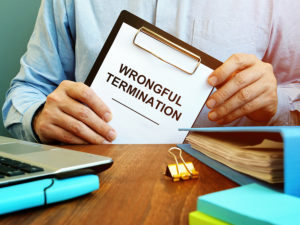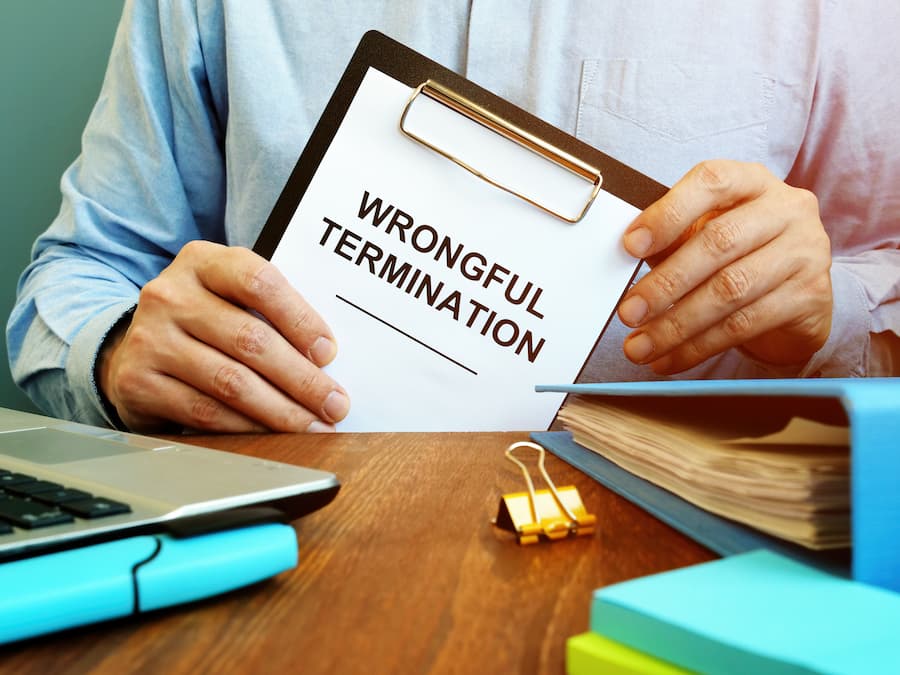Overcoming an Arbitration Agreement as Part of Pursuing Your California Wrongful Termination Case in Civil Court
Arbitration agreements within employment contracts are common. A lot of employers make their new employee's sign versions of these agreements that call for the employee to waive the right to pursue claims like
wrongful termination in San Mateo court and instead adjudicate them in an arbitration proceeding. On the surface, that might not seem especially problematic, but risks lurk beneath the surface, and those risks may indicate that your wrongful termination action should be a court case, not an arbitration one.
Getting to court, then, means not just demonstrating your wrongful termination, but also the unenforceability of your arbitration agreement. At each of these steps, a
knowledgeable San Mateo wrongful termination lawyer can help immensely.
F.T.'s allegedly
wrongful termination occurred in early 2020 after the woman had spent 11+ years as a claims worker with the employer. Two months after the claims worker filed her lawsuit, the employer asked the judge to compel the two sides to undergo arbitration.
As noted above, there are potential drawbacks to proceeding in arbitration as opposed to going forward in court. In an arbitration hearing, your case is decided by an arbitrator or arbitration panel. These are often legal professionals like retired judges or lawyers. That means no juries, and jury trials are often more favorable to workers.
Additionally, the amount of pre-trial discovery (which is the process where you can demand disclosure of information from the other side) is broader in a civil trial than in an arbitration proceeding. That limitation, like the absence of a jury, is something that typically favors employers.
Ways to Get Your Arbitration Agreement Scrubbed

There are several ways in which an
arbitration agreement may be unenforceable. If the employer procured the employee's signature was defective, then a court may decide the two sides never had a valid, binding agreement to arbitrate. Another is if the terms of the arbitration agreement are so one-sided in favor of the employer that it qualifies as "unconscionable."
In T.F.'s case, the proof of her "agreeing" to arbitrate was the clicking of a box marked "Done" on an online form. The evidence the employer had to support her having clicked this box was not strong. If she had clicked the box, it would have generated an automatic email sent to her work email address. The employer never produced any email of that nature.
In this circumstance, even if the employer had proved that the employee signed the agreement, it still would not have been entitled to a resolution through arbitration. California law bars the enforcement of contractual agreements that are unconscionable as a matter of law.
In this state, an agreement may be either procedurally unconscionable or substantively unconscionable. According to the trial judge overseeing T.F.'s case, her agreement was both.
Procedural unconscionability occurs in the way that your employer goes about presenting your arbitration agreement to you. If the manner of presentation was unfair, unreasonably surprising, or otherwise forced on you, then that's procedural unconscionability.
Substantive unconscionability happens when the agreement's terms are excessively one-sided. For example, in 2019, a California Court of Appeal said that an arbitration agreement that required the sides to split the costs and that barred the employee from recovering several types of damages was substantively unconscionable.
Arbitration procedure costs are often extremely high, thereby making arbitration potentially prohibitively expensive for a worker. Additionally, forcing a worker to give up the pursuit of things like punitive damages, statutory penalties, and attorneys' fees (that would have been available in civil court) was substantively unconscionable.
As you can see, these matters involve intricate and in-depth issues of law. Don't go it alone when it comes to your
wrongful termination case. The skilled
San Mateo wrongful termination attorneys at Galine, Frye, Fitting & Frangos, LLP are here to help.
Our team has the skills and experience necessary to get results for wrongfully terminated workers. To set up a free consultation with one of our helpful attorneys, contact us at 650-345-8484 or through our website.
 There are several ways in which an arbitration agreement may be unenforceable. If the employer procured the employee's signature was defective, then a court may decide the two sides never had a valid, binding agreement to arbitrate. Another is if the terms of the arbitration agreement are so one-sided in favor of the employer that it qualifies as "unconscionable."
In T.F.'s case, the proof of her "agreeing" to arbitrate was the clicking of a box marked "Done" on an online form. The evidence the employer had to support her having clicked this box was not strong. If she had clicked the box, it would have generated an automatic email sent to her work email address. The employer never produced any email of that nature.
In this circumstance, even if the employer had proved that the employee signed the agreement, it still would not have been entitled to a resolution through arbitration. California law bars the enforcement of contractual agreements that are unconscionable as a matter of law.
In this state, an agreement may be either procedurally unconscionable or substantively unconscionable. According to the trial judge overseeing T.F.'s case, her agreement was both.
Procedural unconscionability occurs in the way that your employer goes about presenting your arbitration agreement to you. If the manner of presentation was unfair, unreasonably surprising, or otherwise forced on you, then that's procedural unconscionability.
Substantive unconscionability happens when the agreement's terms are excessively one-sided. For example, in 2019, a California Court of Appeal said that an arbitration agreement that required the sides to split the costs and that barred the employee from recovering several types of damages was substantively unconscionable.
Arbitration procedure costs are often extremely high, thereby making arbitration potentially prohibitively expensive for a worker. Additionally, forcing a worker to give up the pursuit of things like punitive damages, statutory penalties, and attorneys' fees (that would have been available in civil court) was substantively unconscionable.
As you can see, these matters involve intricate and in-depth issues of law. Don't go it alone when it comes to your wrongful termination case. The skilled San Mateo wrongful termination attorneys at Galine, Frye, Fitting & Frangos, LLP are here to help.
Our team has the skills and experience necessary to get results for wrongfully terminated workers. To set up a free consultation with one of our helpful attorneys, contact us at 650-345-8484 or through our website.
There are several ways in which an arbitration agreement may be unenforceable. If the employer procured the employee's signature was defective, then a court may decide the two sides never had a valid, binding agreement to arbitrate. Another is if the terms of the arbitration agreement are so one-sided in favor of the employer that it qualifies as "unconscionable."
In T.F.'s case, the proof of her "agreeing" to arbitrate was the clicking of a box marked "Done" on an online form. The evidence the employer had to support her having clicked this box was not strong. If she had clicked the box, it would have generated an automatic email sent to her work email address. The employer never produced any email of that nature.
In this circumstance, even if the employer had proved that the employee signed the agreement, it still would not have been entitled to a resolution through arbitration. California law bars the enforcement of contractual agreements that are unconscionable as a matter of law.
In this state, an agreement may be either procedurally unconscionable or substantively unconscionable. According to the trial judge overseeing T.F.'s case, her agreement was both.
Procedural unconscionability occurs in the way that your employer goes about presenting your arbitration agreement to you. If the manner of presentation was unfair, unreasonably surprising, or otherwise forced on you, then that's procedural unconscionability.
Substantive unconscionability happens when the agreement's terms are excessively one-sided. For example, in 2019, a California Court of Appeal said that an arbitration agreement that required the sides to split the costs and that barred the employee from recovering several types of damages was substantively unconscionable.
Arbitration procedure costs are often extremely high, thereby making arbitration potentially prohibitively expensive for a worker. Additionally, forcing a worker to give up the pursuit of things like punitive damages, statutory penalties, and attorneys' fees (that would have been available in civil court) was substantively unconscionable.
As you can see, these matters involve intricate and in-depth issues of law. Don't go it alone when it comes to your wrongful termination case. The skilled San Mateo wrongful termination attorneys at Galine, Frye, Fitting & Frangos, LLP are here to help.
Our team has the skills and experience necessary to get results for wrongfully terminated workers. To set up a free consultation with one of our helpful attorneys, contact us at 650-345-8484 or through our website. 
